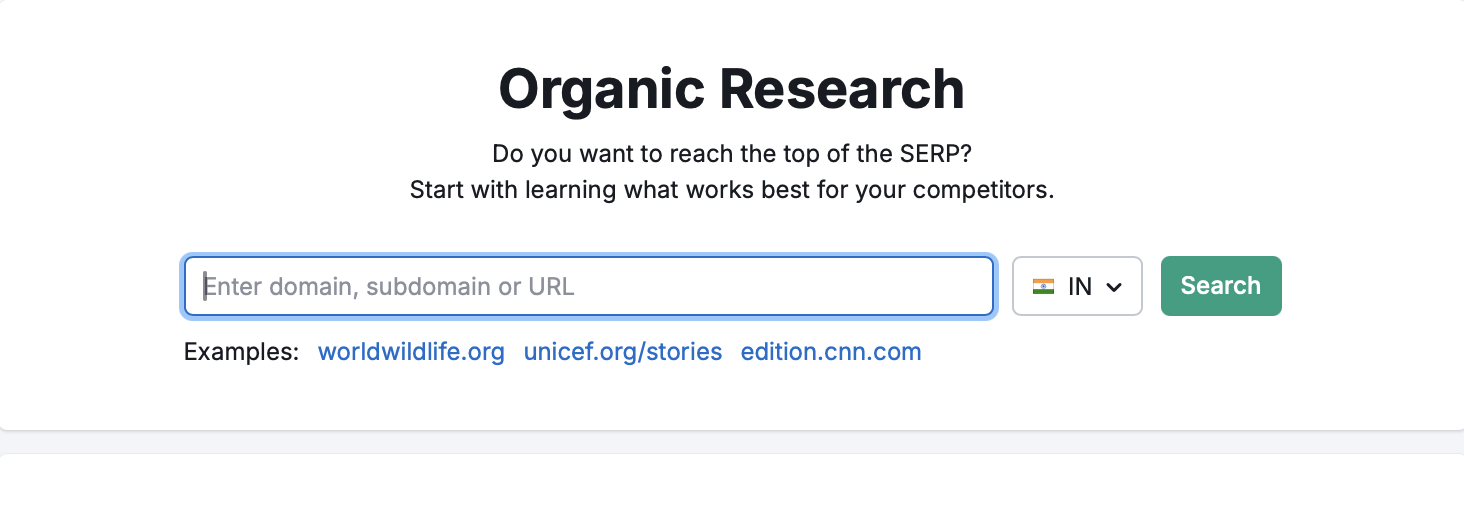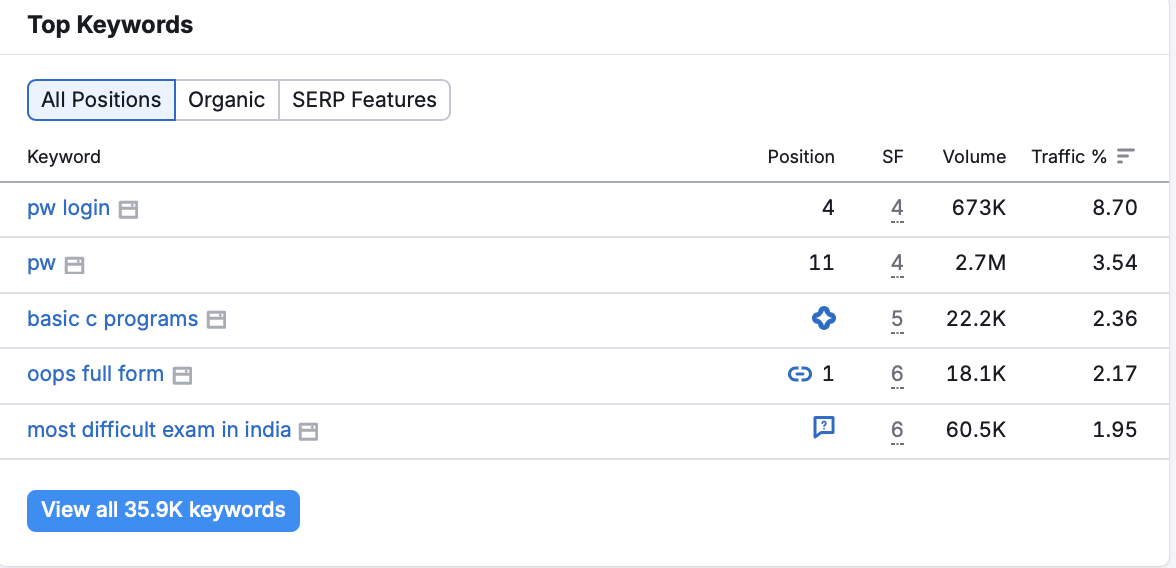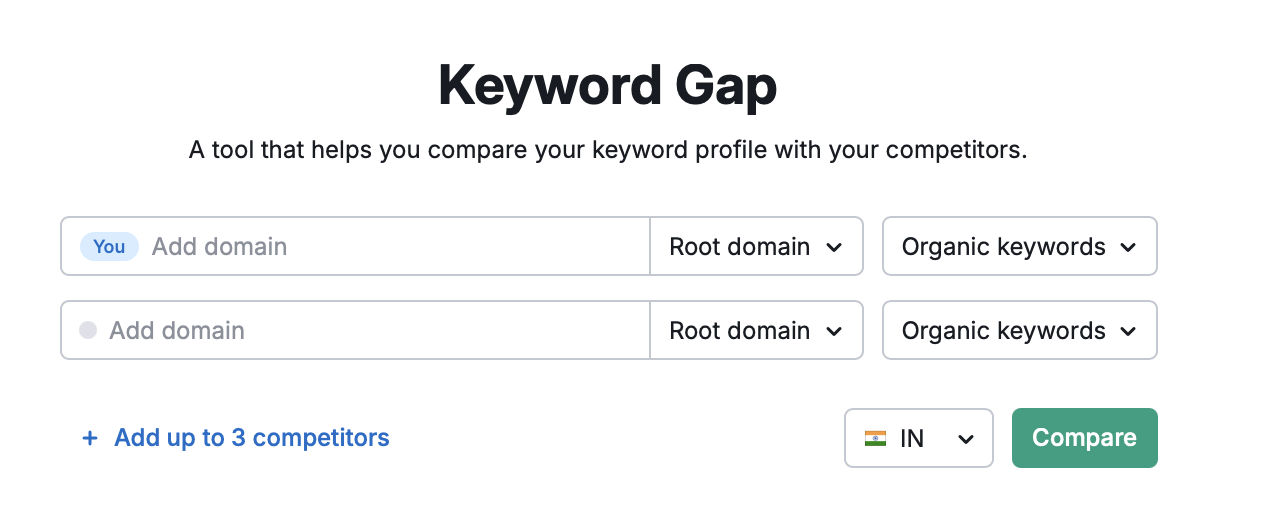Competitor keyword analysis is one of the smartest strategies of SEO to lock onto better ranking on search result pages. You already shortlisted your competitors, and now you can see what keywords they are ranking for on SERPs. You can identify your competitor keywords to enhance your website’s visibility and gain more traffic from organic search results on your pages.
You already shortlisted your competitors, and now you can see what keywords they are ranking for on SERPs. Here, we will learn how to conduct a successful competitor keyword analysis and use the list for our own advantage i,e. Getting more organic reach and engagement.
What Is A Competitor Keyword Analysis?
Competitor keyword analysis is a process by which you can find and shortlist top-ranking keywords for which your competitors are ranking on Google SERPs. You can apply various filters apart from just SERP ranking i,e. Keyword relevancy, intent, search volume, YoY, and more.
- Competitive keyword research is a method that allows you to uncover new keywords in the same niche from your competitors’ websites.
- Competitor research is all about finding keywords that your competitors rank for.
- There are many tools which can help you conduct competitor keyword analysis including semrush, ubersuggest, SpyFu, Buzzsumo, and more.
- You have to analyse what works for your competitor and identify their weakness to your advantage.
Why Use Competitor Keyword Analysis?
Well, you might be thinking, why choose your competitor’s strategy rather than making one? Your competitors are already ranking for the keywords you want to target to reach your audience. Hence, using their successful keywords might give you an upper hand in SEO strategy.
This is an effective approach where you will get the list of keywords capable of getting more traffic and engagement on the search result pages. When you tap into your competitor’s keyword approach, you can uncover new opportunities to rank on specific keywords as well as trending keywords. Competitor keyword analysis also allows you to discover gaps in your SEO strategy and resources to fix them.
- With a competitor keyword strategy, you will get better insights into your industry that can help you rank higher in SERP and gain more organic traffic.
- You can uncover hidden traffic opportunities to target your audience using keywords for which your competitors are ranking.
- Get complete analysis of what type of contents rank on Google, to craft content for maximum SEO impact.
- With optimized content around these keywords, you can outrank your competitors and attract valuable customers for your products or services.
Read More: Semantic Keywords: Best Ways To Optimize Content For Semantic Keywords In 2025
How to Uncover Competitor Keyword Strategy Using Semrush?
Let us help you with effective steps to uncover your competitor’s keyword strategy
1. Single Competitor Keyword Research
You can easily find out the valuable keywords from one of your most important competitors. Follow the simple steps below.

- Step 1: Go to the Semrush dashboard. Select the “Organic Research”.
- Step 2: Enter the domain name of your competitor’s site. Select the country you want to choose and type the URL in the available space.
- Step 3: You will get a complete overview of the keywords used by your competitor.

- Step 4: Click on “View all Keywords” to check the complete list of keywords.
- Step 5: You will get complete details along with ranking position, traffic percentage, search volume, keyword difficulty, and more helping you get an in-depth analysis.
2. Multiple Competitor Keyword Research
You can compare up to five of your competitors at one time and identify gaps in your search visibility.
- Step 1: You have to enter your homepage URL and the sites you want to compare with.
- Step 2: Select additional information like organic, paid, location, and more.

- Step 3: After selecting all your preferences, click on the “Compare” button. Make sure to select your desired location just adjacent to the “Compare” button.
- Step 4: You can find the complete shared, missing (gap), strong, untapped, unique list of keywords from your competitor’s site.
How to Use Competitor Keyword Analysis?
There is a definite flow that you will need to follow to gain the full benefit of conducting competitor keyword analysis.
1. Evaluate Potential Keyword Metrics
Once you have the list of keywords, you have to check for important keyword metrics to find the best opportunity to rank.
- Search Intent: Check whether or not the search intent matches the content you want to get engagement and conversions for. Search intent can be navigational, commercial, transactional, or informational.
- Search Volume: It is an important metric in overall strategy as it tells the average number of monthly searches for a keyword. It indicates the reach the following keywords can help you gain on your page.
- Keyword Difficulty: This metric is generally presented in percentage and represents how hard it will be to rank for the following keyword on SERP.
- Cost Per Click: This metric represents the average price an AD advertiser needs to pay per click in Google Ads. It signals the difficulty and potential cost involved.
2. Begin With the Right List
On Semrush, you will get a list of shared, missing, weak, strong, untapped, and unique keywords, each listed in a separate column.
- Study the search intent to decide the type of content you want to create for your webpage.
- Try to fill out the space that your competitor was not able to tap.
- Prefer to choose the “Missing” and “untapped” column first.
- Make sure the keywords you pick align with the search intent you want to rank on Google search result pages.
- If top brands or high domain authority pages rank on a keyword, choose alternative keywords having the same intent i,e. Long tail keywords.
3. Cover Content By Subject Matter Experts
Pages ranking on the top might have gained high topical authority around a keyword, as an expert SME covered the topic with in-depth matters of content relevant to the targeted audience.
- Make sure the topics you cover match the search intent of your audience query.
- Ensure well-connected interlinking and citation on your pages from trusted institutes or brands.
- Ensure a strong backlink portfolio and domain authority of your page before covering content with high KD (Keyword Difficulty).
4. Leverage PPC Clicks
When you spot your competitor ranking for a keyword that is likely to give you conversions, you can target it in your own campaign. Check important metrics like Pay Per Click (PPC), competition, cost percentage, and more.
- Run a short time campaign to monitor the results.
- Track the complete results with event tracking using GA4 Google Analytics
Tools For Keyword Competitive Analysis
Many tools are available online that can be used to complete keyword competitive analysis. Let us check some of the best options available online.
1. Google Keyword Planner (Free)
Google Keyword Planner is a free tool provided by Google Ads that can be used to discover new keyword ideas, analyze search volume trends, and check competition levels on a keyword phrase.
While it is primarily built for advertisers and paid campaigns, SEO professionals also use it to find keyword potential. The data comes directly from Google, which makes it even more reliable for search demand insights.
Features
- It offers search volume data, YoY, and forecasts
- You can check keyword competition levels i,e. low, medium, and high
- It also offers location-based keyword targeting
- You can check historical trends and seasonal variations
2. SEMrush (Paid)
SEMrush is one of the most popular SEO and marketing frameworks, with powerful keyword competitive analysis. It provides in-depth insights into organic and paid keywords, competitors’ strategies, and SERP features. Its large database and competitive research functions make it a go-to tool for agencies and professionals.
Features:
- You can check the keyword Difficulty Score
- Calculate competitor keyword gap analysis
- Make a comparison of Organic vs. paid keyword insights
- SERP feature tracking and trends
- Backlink and site audit integrations
3. Ahrefs Keywords Explorer (Paid)
Ahrefs is among one of the most trusted SEO tools with detailed keyword analysis using clickstream data, giving more accurate insights into search traffic and user behavior.
This tool not only shows you keyword difficulty but also the expected clicks, helping prioritize keywords with real traffic potential.
Features
- Keyword Difficulty (KD) score
- Click-through rate (CTR) and clicks estimation
- Parent topic clustering
- Global keyword database in multiple languages
- Competitor ranking keywords and traffic potential
4. Ubersuggest (Paid)
Ubersuggest is an SEO tool developed by Neil Patel, a digital marketing professional. It is an affordable alternative to many premium SEO tools with features like keyword ideas, search volume, competition data, and even content ideas around keywords. This is one of the perfect options for beginners or small businesses on a budget.
Features
- Keyword suggestions and search volume
- SEO difficulty vs. paid difficulty score
- Content ideas from top-ranking pages
- Backlink data overview
- Daily keyword tracking (paid version)
Competitor Keyword Analysis FAQs
Q1. What is a competitor keyword strategy?
Ans: Competitor keyword strategy is an approach where you can find the highly valued ranking keywords of your competitors and include them in your SEO strategies to gain traffic and conversions.
Q2. Which is the best tool for competitor keyword strategy?
Ans: You can conduct competitor keyword strategy using various SEO tools like SEMrush, Ahrefs, Google Keyword Planner, and more.
Q3. What are competitors keyword analysis tool?
Ans: Competitor keyword analysis tools help you find high search volume for which your competitors rank on the search result pages.
Q4. What is the keyword gap?
Ans: A keyword gap in SEO is the set of keywords that your competitors are ranking for compared to your website. It is a process used to compare your website to uncover the missing, high value keywords.

